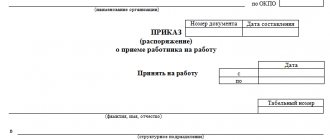Labor legislation guarantees full and timely payment of wages to employed citizens. In this case, the payment should not be lower than the minimum wage established by law. If the employer, for one reason or another, does not comply with this rule, the employee has the right to file a complaint against him and defend his rights in court. You will have to answer for the violation.
The article explains what exactly employees need to do if the employer deliberately lowers the minimum wage in its own interests and when a reduction in the amount of wages would be legal. In addition, the issue of liability of employers who violate the labor rights of citizens is revealed.
- Where can I complain about low pay?
Minimum wage size
Minimum wage (SMW) is the smallest fixed amount due by law to each employee, provided that he fulfills the monthly labor standard for a certain position (Article 133 of the Labor Code).
Regardless of the form of ownership of the employer, he is obliged to adhere to this indicator when calculating the employee’s remuneration.
The minimum wage is set annually by Federal Law No. 82 “On the minimum wage” dated June 19, 2000, and as of the beginning of 2021 it is equal to 12,792 rubles.
In what cases can the salary be less?
List of circumstances when an employer legally has the right to pay an employee less than the established minimum wage:
- Without personal income tax . It is the wages accrued to the employee that must correspond to the minimum wage. Therefore, it is acceptable if after paying income tax, the actual amount received in hand will be less.
- When holding . A number of situations oblige the employer to make deductions from the income received by the employee on the basis of a writ of execution. There are no violations if, before deductions, the salary amount complied with the requirements of the law.
- Without joining a regional agreement . Payment for labor may correspond to the minimum wage operating at the federal level, but be inferior to the regional one. The situation, although procedurally costly, is legal.
- When working part-time . An employee spends no more than half of the working time spent at his main place of employment on part-time work. In case of part-time work, the salary is calculated in proportion to the time worked from the established minimum wage.
- When working part-time (reduced working day or week) . The employer has the right to pay less than the minimum wage, but accruals must be made based on the time worked by the employee in proportion to the approved minimum wage.
- With cumulative accounting of time worked . The employee’s actual working time is summed up and, if his performance is below the established monthly norm, the employer has the right to reduce his salary.
- When an employee takes sick leave . During this period, the employee is not paid for his work. Sick leave is paid at the expense of the social insurance fund.
- If the employee went on unpaid leave . Vacation is not paid by the employer, so a deviation from the minimum wage is acceptable.
- When idle . If the employer is not at fault, he has the right to pay employees only 2/3 of the standard salary due to them. Therefore, the indicator may fall below the minimum payment.
- While walking . Days on which an employee intentionally did not go to work without good reason are considered absenteeism. This period is not paid, which leads to a decrease in wages, including below the minimum wage.
- When an employee works under the terms of a civil contract . Civil Procedure Code rules apply here, so the minimum wage may not be observed.
If, due to the nature of the work, wages must be paid taking into account the coefficient, understating payments is unacceptable. Allowances and compensations here are considered mandatory and are calculated separately from the minimum wage, and then added to it. For example, if working conditions are harmful to the employee’s health.
Less than the minimum wage on hand
Sometimes it turns out that an employee receives less than the minimum wage, and this is legal. In this case, the salary includes the figure established by federal law. This may happen when:
- the amount issued is reduced due to accrued personal income tax (the “dirty” salary corresponds to the minimum level, and a smaller amount is obtained by deducting 13%);
- other mandatory deductions are deducted from the salary - the amount of the minimum wage issued can be reduced by insurance, membership dues to a trade union, etc.;
- the employee has arrears in alimony payments (up to 70% of wages can be written off under a writ of execution).
What threatens the employer if the salary is below the minimum wage?
Compliance by employers with the minimum wage is guaranteed by the following regulations:
- Constitution of the Russian Federation (Article 7).
- Labor Code of the Russian Federation (Article 133 and 133.1).
- Law No. 82 (Article 2 and 3).
Ignoring the requirements for compliance with the minimum wage on the territory of the Russian Federation entails liability:
Administrative liability - fine
The violation consists in the determination by the culprit of wages in an amount less than that provided for by labor legislation.
Responsibility under Part 6 and Part 7 (repetition) of Article 5.27 of the Code of Administrative Offenses:
- the violator is an individual entrepreneur - a fine of 1 to 5 thousand rubles will be imposed (if repeated - 10-30 thousand rubles);
- the culprit is an official - they will issue a warning or be fined 10-20 thousand rubles (if repeated - 20-30 thousand rubles);
- if the offender is an organization, then the fine is from 30 to 50 thousand rubles (if repeated - 50-100 thousand rubles).
In parallel, the manager also bears responsibility (part 3 of article 2.1 of the Administrative Code).
Criminal penalty
They may be held liable if an employer pays employees less than the established minimum wage for more than two months A prerequisite is personal or selfish interest.
Liability under Part 2 and Part 3 (grave consequences) of Article 145.1 of the Criminal Code of the Russian Federation:
- A fine of 100-500 thousand rubles (for serious consequences - 200-500 thousand rubles).
- Forced labor for up to 3 years (part 2 only).
- Imprisonment for a period of up to 3 years (with grave consequences from 2 to 5 years).
Additionally, they may be prohibited from holding a position or conducting a specific activity for a period of 3 (part 2) to 5 years (part 3).
What should an employee do if the salary is low?
Next, let’s look at a company employee who is paid little (below the minimum wage) and find out where to apply and where it’s pointless. We will also give step-by-step instructions for action.
Where can I complain about low pay?
You can file a complaint about wages below normal to the following authorities:
- Trade union organization . It is authorized to evaluate the activities of employers and verify their compliance with labor standards.
- Prosecutor's office . Here they mainly consider complaints against government agencies. For this reason, it is better to complain here about state or municipal structures if the latter have committed violations in the labor sphere.
- State Labor Inspectorate . Authorized to conduct inspections in all cases of violation of labor standards by employers.
- Court . If there are supporting documents, then you can defend your legal rights through the court. Applications are accepted either by the district court or the magistrate.
Prosecution
To understand how to act in a specific situation of violation of labor rights, first of all, you need to familiarize yourself with the general procedure for bringing perpetrators to justice.
Step 1. Submitting a complaint to the State Tax Inspectorate
We have already discussed the process of filing a complaint in detail separately here, so below we will only briefly recall the main points.
This organization is primarily authorized to verify the facts stated in citizens' complaints and respond to them. The purpose of the inspection is to identify and eliminate violations of the labor rights of citizens. The culprits will definitely be brought to justice.
The organization carries out verification of all complaints, provided that they are not anonymous. It is possible to hide the identity of the complainant upon a separate written request from the complainant.
You can submit a complaint in person, send it by mail (including e-mail), using the State Services portal, through the official GIT portal or the onlineinspection.rf service.
Step 2. Inspection of the employer by Rostrud inspectors
Based on the submitted complaint or application, an unscheduled inspection of the potential violator will be initiated. During the inspection, other violations of labor laws may also be revealed. Liability for each violation will be separate.
The legal basis for inspections is the Labor Code and FS No. 294 of December 26, 2008. Such inspections are carried out suddenly, without warning the organization’s management.
Inspectors are authorized to check a fairly wide list of documentation: constituent, local, affecting a specific area of interaction between employees and administration, relating to accruals, payments, additional payments for work performed. The full list of powers is specified in Article 357 of the Labor Code.
Step 3. Issuing an order to eliminate the violation
When cases of violations of labor legislation are identified, the inspector prepares and submits to the organization an order to correct them.
The document describes the violations and how they can be corrected. It should be clear how exactly the inspector will check the results of correcting the situation.
After the expiration of the instruction, representatives of Rostrud will conduct an additional unscheduled inspection of compliance with the requirements.
An extension of the period allotted for correcting a violation is possible, but at a separate request from the employer and if there are good reasons. Such a petition to extend the deadline for fulfilling the order is submitted no later than 10 working days before the end of the period stated in the order for correcting detected violations of labor legislation (Administrative Regulation No. 354n dated October 30, 2012).
If signs of major violations (administrative and criminal) are detected, the materials are transferred to law enforcement agencies or the court (Article 357 of the Labor Code).
Step 4. Go to court
After going to court, an employee whose labor rights have been violated has the right to demand part of the unpaid wages and compensation.
The period for employees to file a lawsuit is limited to 1 year. It is counted from the moment when the salary should have been paid in full (Part 2 of Article 392 of the Labor Code).
It is recommended to contact the above-mentioned supervisory authority in advance. Documents collected by the inspectorate after an inspection of the organization will be useful.
When going to court, an employee has the right to claim payment from the employer:
- compensation for the entire period during which he received payment below the established minimum;
- additional monetary compensation for delayed payments;
- moral damage in financial equivalent.
Additionally, the employer will be held liable for evading mandatory tax payments.
There is no need to pay a state fee when filing a claim (clause 1 of part 1 of Article 333.36 of the Tax Code).
What is the minimum wage and how is it applied?
The law determines that the minimum wage is the minimum amount of earnings that must be paid to an employee for the past month, provided that he has fully worked the standard (shift) time schedule.
The size of the minimum wage is established by the state and fixed by issuing a normative act. If an employer attracts hired personnel, he must unconditionally comply with the current minimum wage. Supervisory authorities have the right to verify compliance with this requirement, and if violations are identified, to hold the business entity accountable. It is determined in the Code of Administrative Offenses.
After the imposed fines have been transferred, the company must still bring the amount of earnings to the minimum wage.
Attention! Salary may include several types of payments, for example, if there is a bonus. At the same time, their total amount is compared with the minimum wage. Therefore, can the salary be less than the minimum wage - yes, if the salary includes other payments. But with piecework wage calculation, the final remuneration cannot be paid less than the minimum.
There are two minimum wage standards in the country, depending on who adopts the indicator. The indicator can be set at the federal level, and it must be used throughout the country.
At the same time, each subject of Russia can separately determine the minimum wage for its territory, and it cannot be less than the federal value.
Attention! If a regional minimum wage is established, which is higher than the federal level, then business entities must comply with it. Currently, regional indicators have been established in 85 constituent entities of Russia.
It must be remembered that the minimum wage should be used not only to determine the minimum wage, but also to calculate the amount of social benefits (for pregnancy and childbirth, for illness, etc.).
In addition, until 2021, based on its value, the amount of contributions for entrepreneurs was calculated, which they transferred for themselves. However, starting from this year, the amount of contributions was fixed in exact amounts that did not depend on the minimum wage.
Attention! The mechanism for calculating the value of the basic minimum wage assumes that it is determined on the basis of the subsistence level for the second quarter of the previous year. If, when determining a new value, it turns out to be less than the current one, then the minimum wage is not reduced, but remains at the previous value.








